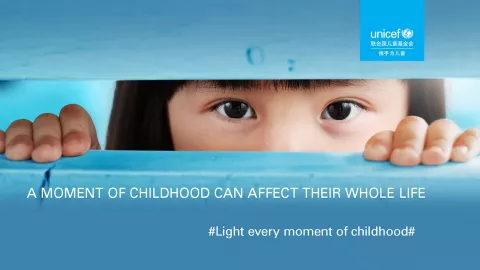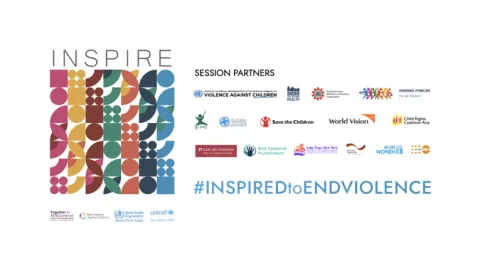New collaboration to fight violence against children
New collaboration to fight violence against children
- Available in:
- 中文
- English
“Help me!” It is the second time Xiao Mei has woken from her nightmare.
Just a few days before, the reality she had to face when waking up was much crueler than a nightmare.
Being controlled
“I've never ever thought it could happen to me,” says Xiao Mei.
Xiao Mei was a 13-year-old girl living in a rural county in China. She had never been to a large city. One day, when she heard of an opportunity to visit a big city during her summer vacation, she was ecstatic.
“A friend of my friend told us that she could take us on the trip. Children like us, who live in poor families, are so curious about city life. So we agreed.”
“It should have been a one hour journey, but it took two days and nights.” Xiao Mei and her friends began to feel terrified on the train journey. “ We didn't find out we had been trafficked until we arrived.”
“It was not the city the woman had promised to take us to. The people who picked us up treated us badly.” Xiao Mei recalled. Far from home, in a strange city, she was forced to become a prostitute.
On the day she left on her “trip,” Xiao Mei's mother found a note on the table, which read: “Dear mom, I'm leaving to get a job.”
“I couldn't believe it.” Her mother had a sickening feeling. A few days later, she received a call. “Mom, I'm good here. Don't Worry about me. ” Xiao Mei said on the other end of the line.
“It didn't make sense. I know my daughter well.” For days and nights the anxious mother could not sleep a wink. She stood by her window through the night, trying to catch a glimpse of her daughter coming back.
Later, a message was sent to her mobile with the single word: “trapped” Xiao mei's mom explained, “As soon as I saw this text I went to the police and Women's Federation for help.”
“We took it very seriously and coordinated police, judicial departments, schools, etc. Altogether more than ten departments were working together to solve this problem,” said Xing Hong, of the local Women's Federation. With the efforts of Women's Federation and police, Xiao Mei was back home by the end of that difficult summer.
The coordinated response to her dramatic case is the approach promoted by a new anti-violence against child project conducted by the Department for Women's Rights and Interests of the All China Women's Federation (ACWF), with support from UNICEF.
More help needed from the society
“After that experience, I was still really frightened. I couldn't sleep at night. I didn't want to see anyone and I stayed alone in my room.” Xiao Mei recalls. “My mother and I are so grateful to Li Yun. Without her help, I could not have come back to my normal life.”
Li Yun, a psychologist, was called to provide psycho-social support as a result of the local 12338 hotline, which is a key pillar of the anti-violence against children pilot project. A community based child protection network was established by local leaders with the hotline helping to connect people in urgent need with all the services of different local government departments available for children at risk of violence.
“She needed a lot of help. At the very beginning, she refused everything. She wanted to leave school and to be away from her classmates who were talking about her. She even told us that she had already found a job.” Li Yun said, “It can be necessary for a child in this situation to change her school, but that might not be easy to do in a small county.”
In order to help the girl, local staff of ACWF worked hard to coordinate with the police, courts and local educators. Eventually, Xiao Mei was moved to a different school.
In many communities cases of child abuse and exploitation do not get comprehensive response from local authorities. Too often these cases “fall through the cracks” if police do not see a clear law enforcement problem, or if social services do not have the influence to find effective solutions, such as in Xiao Mei's case.
“I can't remember how long it took for me to recover. At that time, I could only feel the dark side, but Li Yun and staff from the Women's Federation came to me frequently. I felt warm inside. Finally I decided to let it go.” With the coordinated help from many parties – local government, social services, family and schools – the young girl is now starting her new life and is doing very well in her new school.
According to staff of ACWF, “Child protection is not the work of one single department. All stakeholders in the society must join together.” Tradition often views maltreatment and violence in the family as a private matter, not automatically the responsibility of society or the Government.
“The good practices demonstrated in the case of Xiao Mei are in line with international standards of child protection,” observed Huang Jinxia, UNICEF Child Protection Officer.
Stop violence before it starts
“Globally UNICEF is working on a very important new campaign on preventing violence against children,” said Ms. Gillian Mellsop, UNICEF China Representative.
The community-based child protection network pilot project is being conducted in China. Child victims there like Xiao Mei get coordinated help from all key service providers. And children at great risk of violence are identified through a household screening process, in order to stay ahead of violence, to prevent it from happening in the first place.
For the children and families identified through screening, case-planning meetings will be held to coordinate different resources available for them. Police, women's federation, health workers, hotline staff and community leaders can all be involved, depending on the case.
The ACWF and UNICEF approach does not simply look at better responses to violence. The main effort is on prevention. This is where the focus should be because it has the potential to protect children at far lower cost than a rescue and response approach.
“Ultimately violence and abuse of children will not be ended until root attitudes and beliefs about the role of children in the family and in the community are shifted,” said Gillian Mellsop of UNICEF. “Children and women need to be respected and valued as equals.”
As a result, all children in the project community receive self-protection training in their schools, while parents receive training on using non-violent means of disciplining children.
“Since the project began, the work is progressing well, and we have got the firm backing of experts' technical support,” said Jiang Yue'e, Director General of Department for Women's Rights and Interests, ACWF. “The advocacy for child rights is conducted among children, families and in communities. It's so popular. Some vulnerable children and families have already benefited. We've seen the preliminary results of the project. It also demonstrates and enhances the capacity of the local Women's Federation in protecting children and women's rights. ”
“We need to work with the public, so that they know that violence against children is absolutely unacceptable. And they also need to know of where they can go and report abuse of children if they come across it. They need to know the 12338 hotline number, they need to know they can to go to the police, they can go to the authorities, so that violence against children in the community can be addressed and criminals can be brought to justice.” said Ms. Gillian Mellsop.
To protect the identity of the girl, some of the names have been changed.



